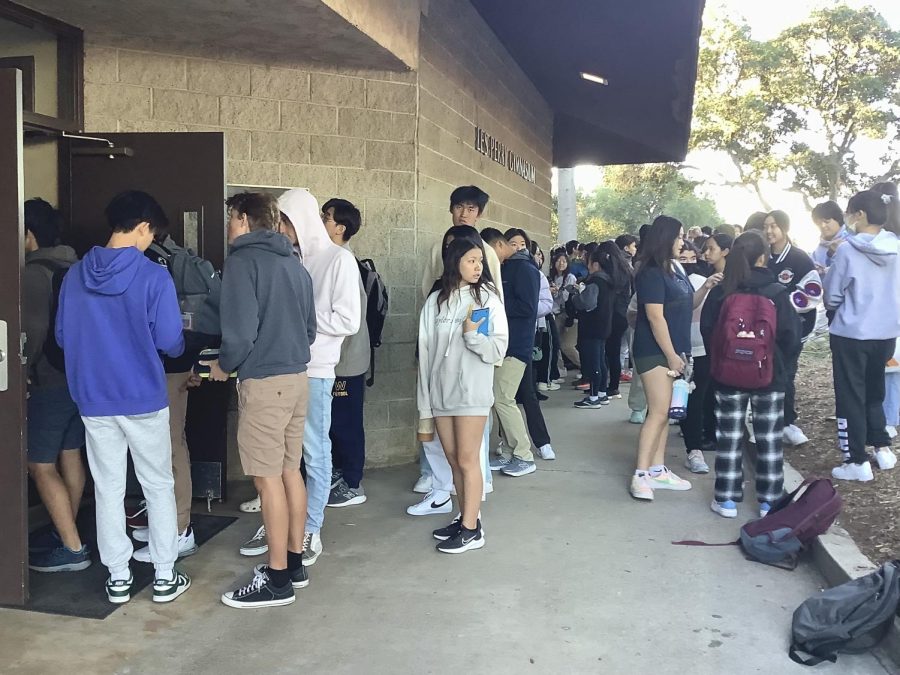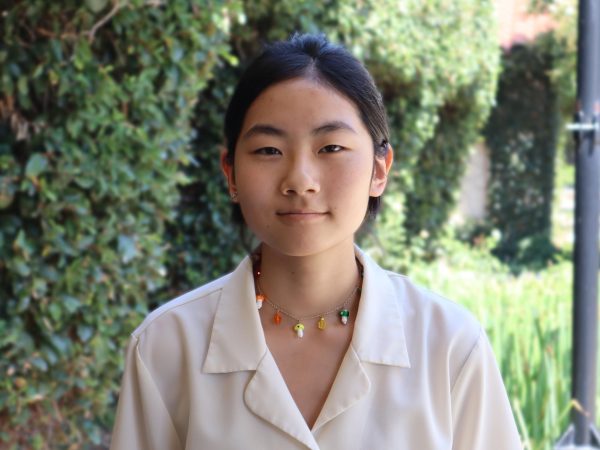“Now, open your test book to Section One. Read the directions and begin work. Good luck, everyone. Time starts now.”
If these SAT test instructions strike a chord with you, you’re not the only one. SAT culture is a huge part of Webb: the specter of PSAT day haunts our calendars, and some students confront their fears in SAT testing rooms multiple times, sacrificing their quiet Saturday mornings to stress and apprehension. But is taking the test even worth it, and will SAT culture ever fade at Webb?
The SAT (Scholastic Aptitude Test) and its partner, the ACT (American College Testing) are college entrance exams designed by psychologist Carl C. Brigham to filter students based on knowledge and ability to learn. But does it really deliver the promise of effectively selecting students? Since 2001, college admissions have been debating whether to make the SAT optional. The debate centers around bias in SAT and ACT questions, particularly against people of color and those of lower socioeconomic class, and how this affects college acceptance.
“I did admissions for ten years before coming to the high school side, [and] during those ten years… the biggest predictors of those exams were not whether they could do the best job at our college, but whether the family was wealthy or not,” said Hector Martinez, Director of College Guidance. “The wealthier the family, the higher the scores. The more educated the family, the higher the scores. The more resources, the higher the scores.”
However, standardized testing, a rigid indicator of status, lost its status with the pandemic. As COVID-19 hit and lockdown started in March 2020, many students could no longer take the SAT or ACT. It was during this uncertain period that colleges began to go test optional, acknowledging that not all students were able to safely take the SAT. Many colleges refused to look at SAT scores altogether.
“Going test optional was a growing trend even before the pandemic,” said Anthony Shin, Associate Director of College Guidance. “For example, University of Chicago was one of the first really big selective schools that went test optional even before the pandemic. COVID-19 fast-forwarded what a lot of schools were already thinking about, and in an awesome way put every school on even ground where pretty much every single selective college and university in the country said, ‘we’re going to be test optional for the next few years.’”
But even after the worst of the pandemic was over, some colleges remained either test optional or test blind. Most notably, the University of California system, or the UC system for short, decided to transition from optional to completely test blind.
“Some of these schools really don’t like what College Board does as an organization; the UC system here in California is a big example,” said Mr. Shin. “Back when they used to have the SAT two subject test, UC was one of the first big major places to say: ‘we’re not going to accept any SAT two subject tests.’ And now, as a big public institution, they’re saying: ‘we are not just being test optional, we’re going test blind, so even if you do submit your scores, we’re not going to accept it.’ All these schools are making these decisions because it matches the philosophy and direction that they want to move in, and it matches what they think is more important in modern admissions as opposed to what they are used to for decades.”
Throughout the transition process, there have been arguments both for and against the SAT. While statistics have shown that black and brown people generally score lower on the SAT than white and Asian people, proponents of the SAT also argue that it provides an opportunity for applicants to show merit, as GPA (Grade Point Average) can also be discriminatory. Some say that the SAT may provide the only universal database for colleges, and to combat other criteria of educational inequity we should make testing free and universal. Others argue that the SAT may be inequitable, but it is just one of the many symptoms of an unjust education system.
In addition to the systemic inequity of standardized testing, SAT preparation takes up a lot of time and energy. That’s why college counselors are advising against it and supporting students to go test optional.
“With test optional admissions, high schoolers that make the choice early on to not take the SAT have the unique opportunity to dedicate that time just to other activities,” said Mr. Shin. “If you imagine the summer they spent on prep and doing practice tests, even just taking the tests three times is around 12 hours, and that’s not even talking about the financial resources.”
Regardless of the growing trend of colleges going test optional and the Webb counselors’ opposition to the SAT, SAT culture is entrenched in the U.S. high school education system, including Webb. Many students still believe in the value of the SAT.
“In the event that I apply to a college and am neck and neck with another applicant, I believe that if I have a good SAT score that I submit with my application, that will boost me above the other applicant,” said Izzy Kim (’24). “For me, it’s just another component of my application that will give the college admission people a better sense of what my academics and my ability to do testing is.”
Some students feel more ambivalent about the exam.
“SAT culture is not a healthy culture, because we feel like we have to do this thing even though we don’t agree with it or don’t know the meaning of it just because everyone else is doing it. It makes me feel like if I don’t do it, I’ll fall behind, so it creates this burden that’s imposed on everybody,” said Stanley Jian (‘23). “But I think there’s a fundamental difference between taking the SAT once for the application process other than training for it just to get a better score. To improve this environment, we should just take it easy.”
Other students don’t see the point in improving the test prep environment and believe in removing the SAT altogether.
“I read about the SAT’s history, how it excludes and discriminates against different groups of people,” said Theresa Hu (‘24). “I don’t think that something with that kind of history should be continually used, especially for college application, because college is such an important part of social mobility.”
For those who went test optional, the choice is clear:
“The SAT is just a process of weeding out people,” said Jackie Shugert (‘24), who committed to not taking the test. “They don’t properly assess students: they claim to look for ‘smarter’ students, but really what standardized testing tests you for is being able to memorize — almost like a machine — and drill these answers and materials. There’s a difference between drilling yourself to memorize things for a system and learning and engaging with content.”
Contributing to these conflicting stances on taking the SAT may be the current uncertainty of the future of test optional; even now, although many colleges are test optional, some still require the SAT.
“Military academies and service academies require testing; some STEM programs require testing, some BA, MD programs — combined medical school programs — require testing,” said Mr. Martinez. “MIT and Georgetown continue to require testing, two super elite colleges that you can’t ignore.”
If your dream school falls into any of these categories, you will still feel the pressure to take the SAT and acquire a good score.
These are concerns for students graduating in 2023, but the next two years are even more uncertain. The classes of 2024 and 2025 are also going to college during a period of turbulence and change. For juniors, there is no clear answer to how different colleges will receive SAT scores and evaluate students for college admission next year.
Regardless of students’ position on the SAT, the PSAT is still a required part of the Webb experience. On October 25th, students lined up in front of the gym in anticipation, waiting for the doors to open. Soon, above students’ murmuring, Mr. Shin shouted seating instructions: juniors in the front, sophomores in the back, WSC on the left, and VWS on the right, with a specific seating outline provided inside. As students settled into their assigned seating, Mr. Shin began reciting the familiar instructions. “Now, open your test book to Section One. Read the directions and begin work. Good luck, everyone. Time starts now.”
After the nearly three hour test was completed, many students felt exhausted — especially juniors.
“Overall, I’m just really tired,” said Oliver Butcher (’24). “It was really early in the morning, and I feel like I didn’t do as well as I probably could have,”
For sophomores, the experience was slightly different. With the stakes of the National Merit Scholarship removed, the test primarily served as a practice run.
“I mean, as a sophomore, I don’t think I was really stressed out about it,” said Ella Chin (’25). “I think it’s a good way of figuring out how you’re doing and where you are.”
But will the decreasing importance of the SAT affect the PSAT? If the SAT is removed, will the PSAT be removed along with it? According to Michael Hoe, Director of Studies, the situation is complicated.
“[The] PSAT’s a little bit more nuanced because it is also the NMSQT (National Merit Scholarship Qualifying Test),” said Mr. Hoe. “The National Merit Score Qualifier is a national program that recognizes the top percentile of students who take it. I do think there is an advantage to the NMSQT or the national program, which is that it does provide scholarships for students who score highly on it. It’s required for all sophomores and juniors; we don’t offer any prep, and I do believe, though I’m not exactly sure, that we absorb all the costs so that way access is open to all our sophomores and juniors. However, if a bunch of schools keep going test optional and the SAT and ACT become obsolete, then I do think it will have a trickle-down effect on the importance of the PSATs.”
The SAT and PSAT’s future remains unsure, and the culture of test taking at Webb is not going away anytime soon. If you’re considering spending your time and money on testing, you might want to reevaluate the meaning of standardized testing and the decision to participate in the system.






![Many Webb students spend their free time in the library watching a popular TV show like Riverdale and Euphoria. “Based off what I’ve seen, like in Euphoria, because the actors are older, they don't showcase an actual high school life properly,” Sochika Ndibe (‘26) said. “Since [the actors] are older [and] playing a teenager, from a girl’s perspective, it is going to make you think you should look more developed at a young age.” The actor, who plays Veronica Lodge, was 22 years old at the time of filming.](https://webbcanyonchronicle.com/wp-content/uploads/2025/03/Antecol-Media-affects-how-society-functions-graphic-1200x900.png)



